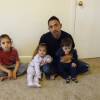This summer, the U.S. ended its 20-year war in Afghanistan. As the Taliban captured the capital, Kabul, tens of thousands of Afghans fled the country, fearing repression and economic collapse.
Farah Emad's family is one of several whose journey out of Kabul led them to New Bedford, Mass. (We are not using her real name out of concern for the safety of family members who remain in Afghanistan.)
On a recent evening, Emad checked on the beans in her small second-story apartment as her three kids waited eagerly for dinner. The older kids pecked at a video game on their mom’s phone, while the youngest, 4, clambered onto the table for an impromptu dance performance.
Emad is grateful for light-hearted scenes like this, since such moments have been hard to come by. In recent months, her family spent most nights sleeping in tents on military bases — in Qatar, Germany and El Paso, Texas. They finally arrived at this apartment a couple weeks ago.
The family’s long journey from Kabul to New Bedford began on the morning of August 15 — but Emad said she didn’t realize it at first. “When we woke up, everything was normal," she said, recalling that day. "My husband left for his job, and the kids left for school.”
Emad worked for the U.S. government’s Agency for International Development, helping train Afghan women to be journalists. Around 10 a.m. that day, Emad got a call from her sister-in-law.
“She told me, ‘The Taliban has come.’ I said, ‘What are you saying? Joking?’ She said, ‘No, no, no, just go and check.’”
Emad flipped on the television to learn that the Taliban had captured Kabul.
Panicked, she tried to call her husband, but she couldn’t unlock her phone — she was too flustered in that moment to remember her passcode. She said her neighbors all across Kabul were feeling the same anxiety.
“The people were very much afraid of the Taliban,” said Emad. “Everyone was hopeless that they have conquered the whole country. Now what? What will happen with our schools, with our education, with our economy, with our culture? We don’t know the answers.”
Ten days later, the U.S. military offered her family a flight out of Kabul, thanks to her work with the U.S. government. The family waited in the airport for three days, with no food, until their flight finally departed. During the wait, a suicide bombing killed dozens of people trying to enter the airport.
Kabul’s banks closed when the Taliban arrived. So despite her well-paying job, Emad took off with no money — just six gold bracelets around her wrist.
Last month, her family was at a camp in El Paso. Emad was teaching an English class to other refugees one day when she got a text informing her of where her family would be resettled long-term. The place name was unfamiliar: Massachusetts.
That’s when the Googling began.
“The first thing I search was the map — where is Massachusetts situated?” she said. Emad was glad to find it on the same side of the country as Virginia, where she has a sister.
Emad’s family spent their final days in El Paso glued to the internet, reading up on their future home state. “It has a good economy,” she said, recalling those days and what she learned online. “The best schools are here. And the housing is very expensive.”
Arriving in New Bedford has meant at least a touch of normalcy. Emad could finally cook her own food for the family, after months of eating military-grade boiled eggs for breakfast.
The first morning in their new apartment, Emad’s kids requested, “‘Mom, cook us eggs in our own style,’” she recalls with a smile.
So Emad fried the eggs, leaving the yolks runny. “They were very, very happy for that.”
Emad’s husband has started a job at a warehouse. Emad is looking for work too. In the meantime, she’s helping her family settle into New Bedford with trips to the playground and a visit to the local mosque. They’ve also taken in some of the city’s signature waterfront sights.
“We have seen the fishing boats,” said Emad, adding that her kids have begged for a ride on one.
The family is one of five who have settled in New Bedford after fleeing Afghanistan this summer. More are waiting to come, but it’s been hard to find housing.
Local aid groups are working to secure housing and accepting donations to support the families. The Immigrants Assistance Center in New Bedford is collecting gift cards to restaurants and supermarkets. The City of New Bedford is taking furniture donations. And the International Institute of New England is accepting cash.
Emad plans to one day start her own mutual aid group to support other Afghan refugees. For now, though, she’s taking things one step at a time. She’s getting her kids registered for school, while also keeping them connected to their homeland through their first language, Dari (which she also calls Persian).
“To be honest, I told them, ‘You’ll learn English at school, but [when] you’re at home, you try to speak Persian so you don’t forget your own language,’” said Emad. “Because it will help them again. I hope we can have a time to move back to our country, be in our country, see our country. So they should not forget their own language.”
Update: This post has been modified from the original to alter names for privacy and safety.








